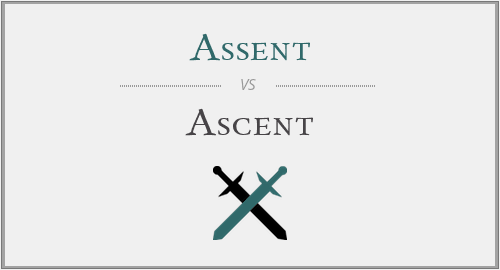He assented to do an Irish accent while they ascended in the air balloon.
What do you think about the above sentence? Does it make sense to you? Are the meanings of the three homophones clear after reading the sentence?
Let us first tell you about the homophone, they are usually a pair of words, in this case triplets of words, which sound exactly the same but have entirely different meanings. The homophones are irreplaceable with each other in speech or writing and you ought to know the meanings of all the homophones in order to distinguish among them. This article will help you understand the meanings of the above mentioned homophones i.e. assent, ascent and accent.
Assent as noun:
Assent is used as a noun where it is the expression of approval or agreement. There was a loud murmur of assent. The noun assent is also employed to express an official agreement or sanction.
The act was given by the Royal Assent.
Assent as verb:
The same meaning of the word is utilized when assent is employed as a verb. When someone expresses agreement or approval regarding something, they assent it.
The Prime Minister assented to the amendment.
Ascent as noun:
Ascent is used as a noun in English language since it originated in the 16th century from Old English word ascend. The word is used to demonstrate a climb or walk to the summit of a mountain or hill. He succeeded in his first attempt of ascent of the Matterhorn. The similar meaning is employed in an upward slope or path that one may walk or climb. The ascent grew steeper as they climbed. An instance rising or moving up through the air is also denoted by ascent. The first balloon ascent was in 1783. Ascent is also used to imply a rise to a higher social or professional rank.
His quick ascent to power is so unnatural.
Accent as noun:
Accent is also a noun and it means a distinctive way of pronouncing a language, especially one associated with a particular country, area, or social class. Sara’s strong British accent was the main reason everyone liked her. Accent is also employed when a distinct emphasis is given to a syllable or word in speech by stress or pitch. His accent usually falls on the middle syllable. Another meaning of accent is a special or particular emphasis on something or a feature which gives a distinctive visual emphasis to something. The accent is on participation.
The accents of red on the white painting gives it a particular tang.

Accent as verb:
The meanings of accent are used when the word is employed as a verb, that is, emphasize on a particular thing or feature of a thing. The yellow and green flowers accent the fabric of the dress. Accent is also used in musical word where it implies to play a note or a beat with emphasis.
The quick tempo means there is less scope for accenting offbeat notes.
Examples:
He stuck his finger into a jar of red ink and left an imprint signifying his assent. (New York Times)
There has been no stopping the ascent of Alexa Chung’s well-documented style. (Telegraph)
The speaker praised BP’s decision to assent to demands that they create an account in escrow to pay out claims it faces as a result of the massive oil spill in the Gulf of Mexico. (The Hill)
The Benders have made a dizzying ascent into indie stardom since their exodus East. (San Francisco Chronicle)
New laws only come into force once they have been assented to by the president and published in the Government Gazette. (Independent Online)
Assent or ascent or accent:
All the three homophones are unrelated to each other and do not share meanings, which makes it certain that they cannot be replaced for one another. When you agree to something, you assent to it. When you move upwards in an elevator or a hill, you ascent. And when you speak in a specific way as indicated by the area you live in, you are speaking with an accent.








Have a discussion about this article with the community:
Report Comment
We're doing our best to make sure our content is useful, accurate and safe.
If by any chance you spot an inappropriate comment while navigating through our website please use this form to let us know, and we'll take care of it shortly.
Attachment
You need to be logged in to favorite.
Log In